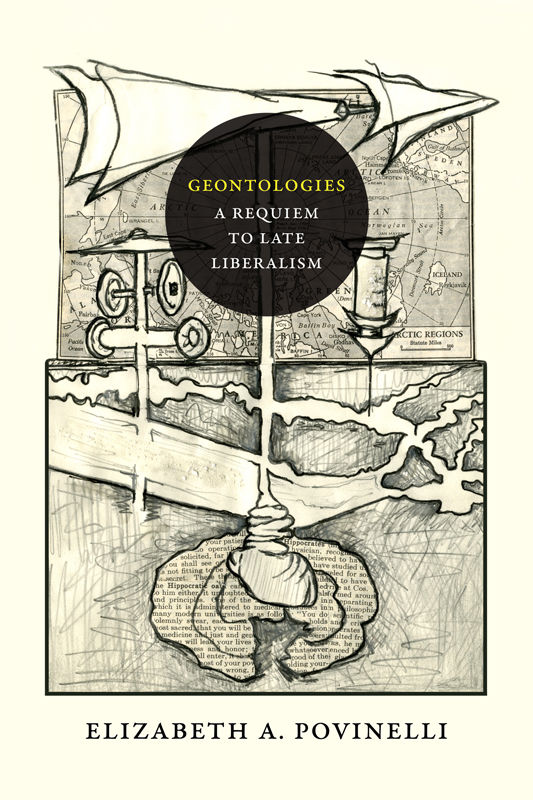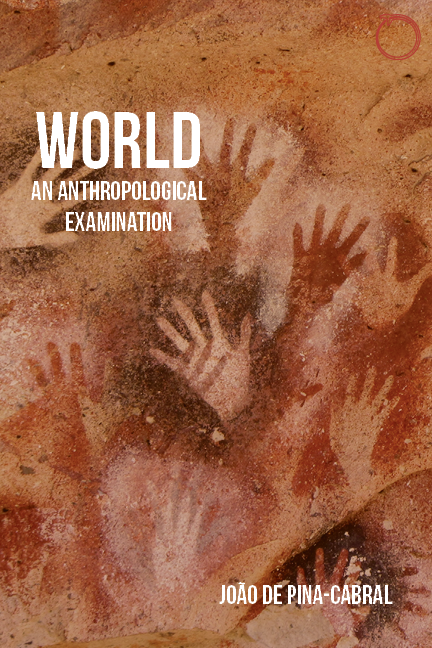Elizabeth A. Povinelli: Geontologies: A Requiem to Late Liberalism (2016)
Filed under book | Tags: · anthropocene, assemblage, being, biopolitics, capital, difference, ethnology, geology, geontopower, governance, indigenous peoples, liberalism, life, ontology, power

“In Geontologies Elizabeth A. Povinelli continues her project of mapping the current conditions of late liberalism by offering a bold retheorization of power. Finding Foucauldian biopolitics unable to adequately reveal contemporary mechanisms of power and governance, Povinelli describes a mode of power she calls geontopower, which operates through the regulation of the distinction between Life and Nonlife and the figures of the Desert, the Animist, and the Virus. Geontologies examines this formation of power from the perspective of Indigenous Australian maneuvers against the settler state. And it probes how our contemporary critical languages—anthropogenic climate change, plasticity, new materialism, antinormativity—often unwittingly transform their struggles against geontopower into a deeper entwinement within it. A woman who became a river, a snakelike entity who spawns the fog, plesiosaurus fossils and vast networks of rock weirs: in asking how these different forms of existence refuse incorporation into the vocabularies of Western theory Povinelli provides a revelatory new way to understand a form of power long self-evident in certain regimes of settler late liberalism but now becoming visible much further beyond.”
Publisher Duke University Press, 2016
ISBN 9780822362111, 0822362112
xii+218 pages
Interview with author: Mathew Coleman and Kathryn Yusoff (Theory, Culture & Society, 2017).
Reviews: Shela Sheikh (Avery Review, 2017), Robin Wright (Society+Space, 2017), Eve Vincent (Australian Aboriginal Studies, 2017), Timothy Neale (Australian Journal of Anthropology, 2017), Andrea Muehlebach (Anthropological Quarterly, 2018), Jean-Thomas Tremblay (Critical Inquiry, 2018), Elizabeth R Johnson, Garnet Kindervater, Zoe Todd, Kathryn Yusoff, Keith Woodward (with author’s response, EPC: Politics and Space, 2019).
Comment (0)Nathan Brown: The Limits of Fabrication: Materials Science, Materialist Poetics (2017)
Filed under book | Tags: · aesthetics, fabrication, literary criticism, literary theory, literature, materialism, materials science, nanotechnology, ontology, philosophy, poetics, poetry, technē

“Poetry, or poiēsis, has long been understood as a practice of making. But how are experiments in the making of poetic forms related to formal making in science and engineering? The Limits of Fabrication takes up this question in the context of recent developments in nanoscale materials science, investigating concepts and ideologies of form at stake in new approaches to material construction. Tracing the direct pertinence of fields crucial to the new materials science (nanotechnology, biotechnology, crystallography, and geodesic design) in the work of Shanxing Wang, Caroline Bergvall, Christian Bök, and Ronald Johnson back to the midcentury development of Charles Olson’s ‘objectist’ poetics, Nathan Brown carves out a tradition of constructivist, nonorganic poetics that has developed in conversation with science and engineering.
While proposing a new approach to the relation of technē (craft, skill) and poiēsis (making, forming), this book also intervenes in philosophical debates concerning the concept of the object, the distinction between organic and inorganic matter, theories of self-organization, and the relation between ‘design’ and ‘nature’. Engaging with Heidegger, Agamben, Whitehead, Stiegler, and Nancy, Brown shows that materials science and materialist poetics offer crucial resources for thinking through the direction of contemporary materialist philosophy.”
Publisher Fordham University Press, New York, 2017
ISBN 9780823272990, 0823272990
xi+296 pages
via Memory of the World
Review: Tom Eyers (boundary2, 2017).
PDF (26 MB)
Comment (0)João de Pina-Cabral: World: An Anthropological Examination (2016)
Filed under book | Tags: · anthropology, imagination, ontogeny, ontology, personhood, society, world

“What do we mean when we refer to world? How does the world relate to the human person? Are the two interdependent and, if so, in what way? What does world mean for an ethnographer or an anthropologist? Much has been said of worlds and worldviews, but do we really know what we mean by these words? Asking these questions and many more, this book explores the conditions of possibility of the ethnographic gesture, and how these shed light on the relationship between humans and the world in the midst of which they find themselves.
As Pina-Cabral shows, recent decades have seen important shifts in the way we relate human thought to human embodiment—the relation between how we think and what we are. The book proposes a novel approach to the human condition: an anthropological outlook that is centered around the notions of personhood and sociality. Through a rich confrontation with ethnographic and historical material, this work contributes to the ongoing task of overcoming the theoretical constraints that have hindered anthropological thinking over the past century.”
Publisher HAU Books, Chicago, 2016
Malinowski Monographs series, 1
Open access
ISBN 9780997367508, 0997367504
232 pages

